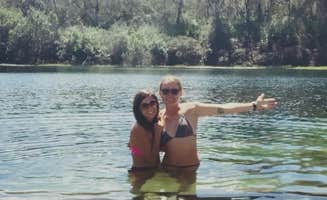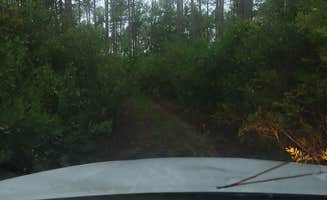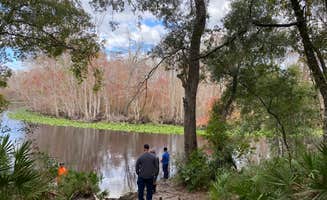Dispersed camping areas in the Ocala National Forest provide primitive off-grid options near Lake Helen, Florida. The forest encompasses over 600 square miles of pine scrub and hardwood habitats with elevations ranging from 20-200 feet. Summer temperatures regularly exceed 90°F with high humidity, while winter nights can drop below 40°F, requiring appropriate camping gear for comfort.
What to do
Fishing access: Davenport Landing offers direct river access for anglers. "We didn't see anything bad with this place when we were there. Had no one around and nice and cool in the forest," according to a Davenport Landing visitor. Local fishermen report good catches in the emerald-green waters.
Wildlife observation: Forest areas contain diverse wildlife including deer, turkey, and various bird species. At Trout Lake Primitive Sites, campers report peaceful surroundings: "The setting is breathtaking. I'd go back in a proper vehicle!" Some areas have reported bear sightings, so proper food storage is essential.
Hiking exploration: Short trails through pine forests connect many camping areas. Several sites offer access to interpretive trails ranging from 0.5-2 miles in length. These routes traverse diverse ecosystems from wetlands to upland pine forests, with minimal elevation changes suitable for most skill levels.
What campers like
Natural isolation: Most dispersed sites provide significant distance from neighboring campers. A visitor to Freak Creek Dispersed Camping noted, "Great place to put a kayak in the water." The creek offers opportunities for swimming and paddling in a secluded setting.
Night sky viewing: Limited light pollution creates excellent stargazing conditions. Open areas near water bodies provide unobstructed sky views. Temperature variations between seasons affect visibility, with winter typically offering clearer night skies due to lower humidity.
Water proximity: Multiple sites feature direct access to rivers or lakes. "Located a hefty trek down a winding gravel road west of Route 19," one reviewer explains about accessing water at Davenport Landing, where paddlers can launch directly from camp into the Ocklawaha River.
What you should know
Vehicle requirements: Most dispersed sites require appropriate vehicles for access. A Blue Sink visitor reported: "Most beautiful place to stumble upon. You may need ATV or creative backpacking to get there now. The Forestry Service recently chopped down trees and covered the easy access roads."
Seasonal challenges: Summer brings intense heat, humidity, and insects while winter offers more comfortable temperatures but occasional cold nights. Spring and fall typically provide the most balanced conditions with moderate temperatures and fewer biting insects.
Campsite preparation: No amenities exist at dispersed sites. Pack in all necessary supplies including drinking water, waste disposal bags, and first aid materials. Plan for complete self-sufficiency with no facilities within quick driving distance of most sites.
Tips for camping with families
Safety planning: Establish clear boundaries for children near water areas. At Trout Lake Primitive Sites, one camper noted: "Not the cleanest but passable." Bring extra cleaning supplies and establish a hand washing station for hygiene maintenance.
Wildlife awareness: Teach children proper food storage and wildlife avoidance. A 14-day stay limit applies to most sites, with no extensions permitted during peak seasons. Bring reference materials to help identify local flora and fauna for educational opportunities.
Site selection: Choose locations with natural boundaries for easier supervision. When possible, select sites further from water edges for added safety with small children. Sites with natural clearings provide better visibility for monitoring activities while maintaining shade coverage.
Tips from RVers
Access limitations: Many forest roads have tight clearances unsuitable for larger rigs. One Trout Lake Primitive Sites visitor warned: "Very narrow trails but really easy access, you will leave with some new pinstripes." Another noted: "Main road entry is packed dirt; smaller access road to sites is two-track about 1/4 mile through woods — very narrow tree clearance."
Ground conditions: Sand and loose soil can create traction challenges. Arrive early to assess site conditions and avoid setting up after dark. Bring leveling blocks as many sites feature uneven terrain that complicates stabilization.
Supplies planning: No hookups or dumping facilities exist at free camping near Lake Helen. The complete lack of services requires careful planning for water, power, and waste management with sufficient reserves for the entire stay duration plus contingency supplies.




